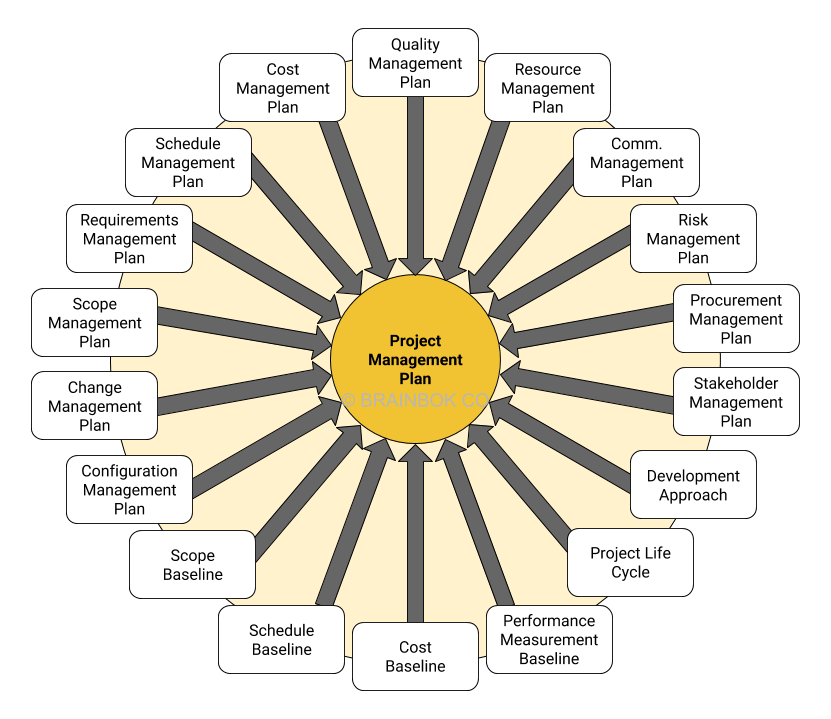Definition
The process of defining, preparing, and coordinating all plan components and consolidating them into an integrated project management plan.
| Process Group | Knowledge Area |
|---|---|
| Planning | Project Integration Management |
Summary
Following are the key points about the Develop Project Management Plan process.
The project management plan is a comprehensive document that defines the basis of all project work and how the work will be performed. It defines how the project is executed, monitored and controlled, and closed.
The project management plan is tailored according to the needs of the project.
The project management plan can be revised as many times as needed before it is baselined. Once it is baselined, it can only be revised through formal change control (Perform Integrated Change Control).
The project management plan is progressively elaborated (refer to the study notes below).
The project management plan should be aligned with the program or portfolio management plan if the project is part of a program or portfolio.
Study Notes
ITTO
| Inputs | Tools and Techniques | Outputs |
|---|---|---|
|
|
|
Inputs
Project Charter
The project charter is a starting point for initial project planning. It provides, at a high level, the project description, objectives, success criteria, schedule, budget and risks. All these are key inputs to developing the component plans - Scope Management Plan, Schedule Management Plan, Cost Management Plan, Risk Management Plan, etc. - of the Project Management Plan.
Outputs from other processes
Baselines (such as scope, schedule, and cost) and subsidiary management plans (such as Scope Management Plan, Schedule Management Plan, Cost Management Plan, Risk Management Plan, etc.) from other planning processes are "integrated" to create the Project Management Plan.
Enterprise Environmental Factors
Relevant EEFs include:
- Government and environmental regulations
- Industry standards
- Labor conditions in the market
- Organizational structure and management policies of the performing organization
- Facilities in which the project will be performed
- Existing company systems and software that the project will use
Organizational Process Assets
Relevant OPAs include:
- Standards, processes, procedures, and policies
- Project files and lessons learned from previous projects
- Templates for project plan and other project documents
- Change control procedures
- Historical information and lessons learned repository
Tools and Techniques
Expert Judgment
Expertise is required for "tailoring" project management processes according to specific needs of the project. Experts help to determine resource requirements, technical and management details, and level of configuration management and change control appropriate for the project. They also prioritize work on the project.
Data Gathering
Brainstorming
Brainstorming is frequently used when developing the project management plan to gather ideas and solutions about the project approach. Attendees include the project team members although other subject matter experts (SMEs) or stakeholders may also participate.
Checklists
Checklists can be used to ensure that all required information is included in the project management plan. Many organizations have standardized checklists available based on their own experience or use checklists from the industry.
Focus Groups
Focus groups bring together stakeholders to discuss the project management approach and the integration of the different components of the project management plan.
Interviews
Interviews are used to obtain specific information from stakeholders to develop the project management plan or any component plan or project document.
Interpersonal and Team Skills
Conflict Management
Conflict management may be necessary to bring diverse stakeholders into alignment on all aspects of the project management plan.
Facilitation
Facilitation ensures effective participation, consideration of all ideas, mutual understanding among participants, buy-in from all participants, and follow-up on actions and agreements achieved.
Meeting Management
Meeting management is necessary to ensure that the numerous meetings that are necessary to develop, unify, and agree on the project management plan are well run.
Meetings
Meetings are used to discuss the project approach, determine how work will be executed to accomplish the project objectives, and establish the way the project will be monitored and controlled. The project kick-off meeting is usually associated with the end of planning and the start of executing.
Outputs
Project Management Plan
The Project Management Plan is an "integration" of baselines (such as scope, schedule, and cost) and subsidiary management plans (such as Scope Management Plan, Schedule Management Plan, Cost Management Plan, Risk Management Plan, etc.) from other planning processes. It may also include Change Management Plan, Configuration Management Plan, Performance Measurement Baseline, project life cycle chosen for the project, development approach (waterfall, agile, hybrid, etc.), and management review points.
Subsidiary management plans:
- Scope management plan
- Requirements management plan
- Schedule management plan
- Cost management plan
- Quality management plan
- Resource management plan
- Communications management plan
- Risk management plan
- Procurement management plan
- Stakeholder engagement plan
Baselines:
- Scope baseline
- Schedule baseline
- Cost baseline
Additional components:
- Change management plan
- Configuration management plan
- Performance measurement baseline
- Project life cycle
- Development approach
- Management reviews
